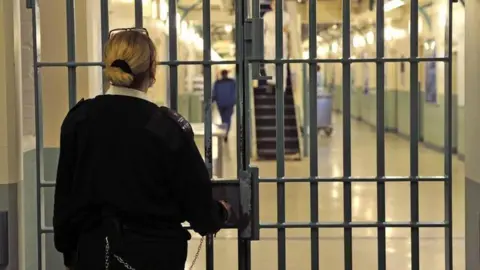HMP Eastwood Park: Brain-injured inmate held in 'inhumane' conditions
 BBC
BBCA brain-injured inmate has been held in "inhumane" conditions and "effective solitary confinement" for more than two years, a prisons watchdog has found.
The woman, who is being held at HMP Eastwood Park, has behavioural problems and a personality disorder.
The watchdog described her treatment as "unlawful" and noted that facilities for men were not available for women.
The Ministry of Justice (MoJ) said it was "working closely" with partner agencies to better meet her needs.
An MoJ spokesperson said: "The prisoner has extremely rare and complex needs and we are working very closely with partners across Government and beyond to ensure we are doing all we can to address them."
The Department of Health has been contacted for comment.
The woman, who was left with a brain injury as a child, is serving a significant sentence for a serious violent assault.
She is allowed out of her cell for a mandatory one hour per day when she is escorted by prison staff at all times.
Her regime at the prison in Falfield, South Gloucestershire, pre-dates measures adopted during the pandemic.
The report by the Independent Monitoring Board (IMB) highlighted the conditions she was held in at HMP Downview and HMP/YOI Eastwood Park during her sentence.
It stated: "The board was particularly concerned about the plight of a brain-injured prisoner who has been segregated for well over two years and has, in effect, been in solitary confinement for this period.
"Little had been achieved to address her long-term needs."
'Complex needs'
The IMB said it had written to the prisons' minister about the prisoner's case but that efforts by staff and other professionals had not "improved her living conditions or addressed her plight".
The report also questioned why there were no specialist beds for women with an acquired brain injury, with behavioural side effects and complex needs, when there were facilities for men with similar conditions.
The report said: "While we understand that normal location is not a possible alternative in her case, because of her behaviour, is it acceptable to provide secure specialist establishments for men with brain injuries and highly complex needs but none for women?"
The report covers the period ending October 2020 but the prisoner is being held in the same conditions.
